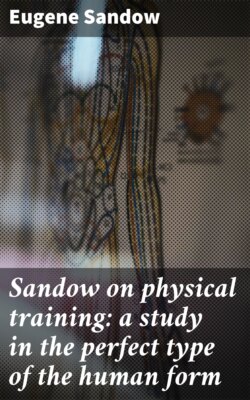Читать книгу Sandow on physical training: a study in the perfect type of the human form - Eugene Sandow - Страница 19
На сайте Литреса книга снята с продажи.
WRESTLING AND FEATS OF AGILITY AND STRENGTH
ОглавлениеTable of Contents
as an amateur. While indulging his tastes, as in an idle pastime, he broke, as will presently be seen, with his father, and that circumstance, coupled, possibly, with the fascinating glamour of the public arena, drew him at last into the profession. Like the high-minded and generous man he is, however, he cares little for the pecuniary rewards of his work. Had he wanted merely to make money, he would no doubt have taken to the pugilist's golden career; but this, we know, was always abhorrent to him.
When, in process of time, Mr. Sandow came to know his own power, we can well imagine the pleasure he took in his continued muscular training. Modest as he is, and inclined, with the instincts of a gentleman, to repress rather than assert himself, we can hardly doubt that, at times, when he scores a great triumph, he takes honest pleasure in looking himself over with the lust of the eye and in the pride of life. With his magnificent physique, he would hardly be human if he did not. But his normal characteristic, professionally and privately, is self-effacement; and though reliant and confident in his powers, he always bears himself modestly. Even when smarting from some provocation, or when a rival contestant unduly draws upon his courtesy and good-nature, he invariably places himself under rigid restraint. Only twice is he known, the occasions of which will afterwards be stated, to have departed from what, considering his strength, will be deemed a merciful habit.
Having regard to the interest of the subject, the earlier portion of the following pages will be confined to telling the tale of Mr. Sandow's public career. In chronicling the story, it is proper to say, that only indisputable facts will be set forth; and it is the desire of Mr. Sandow, as it is that of the writer, that no exaggeration shall be indulged in and no colour given to the narrative beyond that which the facts themselves warrant. This, it is hoped, will be deemed to have been rigidly adhered to, in dealing with incidents which, in London especially, became the subject of much journalistic controversy in relation to Mr. Sandow and his defeated rivals. One thing may be said in this connection, and it is itself a guarantee of good faith, as well as good taste in the subject-character of the book, that Mr. Sandow has never made a claim for himself to which he had not a right, or which the facts themselves do not furnish the proof. After this fashion, and in the spirit we have indicated, we proceed, in the chapters which follow, to unfold the life-history which, with some misgiving as to our ability to do justice to the theme, we set out to relate.
